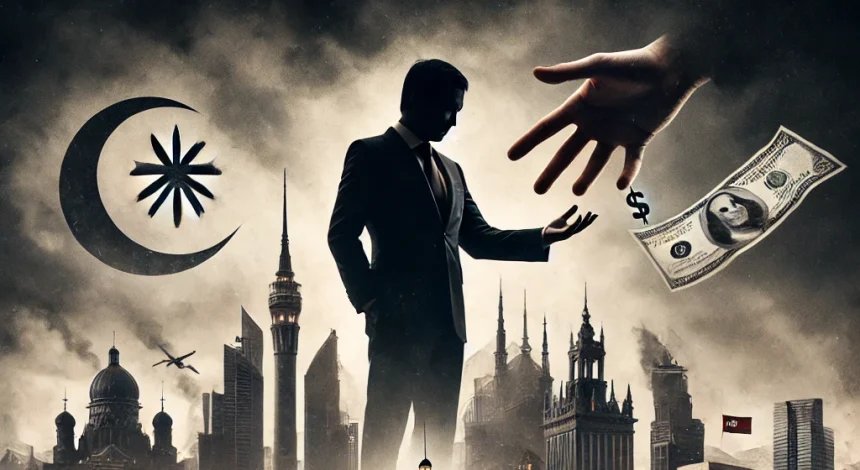Kyrgyzstan, a nation famed for its breathtaking natural landscapes and ancient Silk Road history, hides a darker reality beneath its picturesque veneer. The intertwined fates of Raimbek Matraimov, a former customs official turned political power broker, and Kamchy Kolbayev, one of the country’s most notorious criminal figures, reveal a troubling tale of corruption, crime, and unchecked power. This connection, meticulously uncovered through years of investigative journalism, paints a chilling portrait of organized crime’s infiltration into Kyrgyz governance.
The Shadowy Life of Raimbek Matraimov
Raimbek Matraimov, a former Kyrgyz customs boss, epitomizes the kind of power broker who operates in the shadows. Despite earning an official salary of just over $1,000 per month, Matraimov and his family led an opulent lifestyle that starkly contrasted with his declared income. His wife, Uulkan Turgunova, was unwittingly complicit in revealing the family’s affluence through her social media posts. Her photographs, often taken in exotic locales, allowed investigative journalists to piece together the lavish life enjoyed by the Matraimov family.
In the summer of 2023, Turgunova’s posts provided a significant breakthrough. Photos of her vacationing at the exclusive Kaganat resort on the shores of Lake Issyk Kul pointed reporters to a locale shrouded in secrecy. The resort’s absence from Google Maps and its guarded, fenced-off territory only added to the intrigue. Further investigation revealed that Kaganat was no ordinary resort but a clandestine development tied to Kamchy Kolbayev, a man with a long history of criminal activities.
Kaganat: A Fortress of Secrecy
Kaganat is a private resort village that doesn’t advertise or sell its villas to just anyone. A reporter posing as a potential buyer was told by an Imidzhstroi representative, the construction company behind Kaganat, that ownership required the approval of a “club” led by none other than Kolbayev. The Matraimovs’ stay at one of the villas, which remains formally owned by Imidzhstroi on paper, underscores the clandestine nature of their relationship with the criminal underworld.
The resort’s exclusivity, coupled with its association with Kolbayev, makes it a symbol of how crime and politics intersect in Kyrgyzstan. Locals and insiders alike have pointed to Kolbayev as the true owner of Kaganat, further cementing his influence in the region.

Kamchy Kolbayev: Kyrgyzstan’s Kingpin
Kolbayev’s criminal résumé is as extensive as it is alarming. Known for his role in the international drug trade, Kolbayev has streamlined the “northern route” for heroin smuggling out of Afghanistan, turning a chaotic process into a lucrative, industrial-scale operation. His activities have earned him sanctions from the U.S. Treasury Department, including designations as a “Foreign Narcotics Kingpin” and a member of a “Transnational Criminal Organization.” Despite these international sanctions, Kolbayev has managed to maintain significant political leverage within Kyrgyzstan.
Kolbayev’s influence extends far beyond the criminal underworld. In Cholpon-Ata, his birthplace and base of operations, he is a dominant force. Two recent mayors of the town, including the current one, have ties to him. One, Talant Sarbagyshev, openly admitted knowing Kolbayev since childhood, though he denied any direct influence over his work as mayor. Sarbagyshev’s affiliations with political parties linked to both Kolbayev and Matraimov further highlight the blurred lines between crime and governance.
A Trail of Intimidation and Violence
Kolbayev’s reign has been marked by a trail of violence and intimidation. In 2018, a restaurant owner at Lake Issyk Kul’s Bosteri village accused Kolbayev’s group of extortion. After refusing to pay protection money, his restaurant was burned to the ground. This pattern of fear and reprisal is emblematic of Kolbayev’s modus operandi.
One of the most damning pieces of evidence linking Kolbayev to Matraimov comes from Aierken Saimaiti, a professional money launderer who worked closely with Matraimov. Saimaiti described Kolbayev as Matraimov’s “partner and protector.” His revelations were pivotal in exposing a smuggling empire patronized by Matraimov. However, Saimaiti’s cooperation came at a deadly cost. After facing threats from Kolbayev, he was murdered under mysterious circumstances in 2019.
Saimaiti’s fate is a stark reminder of the perils faced by those who dare to challenge the nexus of power and crime in Kyrgyzstan. His murder, along with threats made to others who opposed Matraimov or Kolbayev, underscores the deadly grip these men have on the country.
The October Uprising and Its Aftermath
The October 2020 uprising in Kyrgyzstan, fueled by widespread corruption and vote-buying, briefly disrupted the status quo. Both Kolbayev and Matraimov were arrested in the aftermath, but their detentions appear to be little more than political theater. Matraimov was released under house arrest, a move justified by the acting president as a means to recover stolen assets. Meanwhile, Kolbayev remains in jail, but videos of him enjoying festive meals with associates in prison suggest that his confinement is far from punitive.
Kolbayev’s influence was evident during the uprising. Rumors swirled of his involvement in behind-the-scenes machinations, including alleged threats to lawmakers. The U.S. State Department’s warning about organized crime’s attempt to exert influence over politics and elections proved prescient. Despite his incarceration, Kolbayev’s network continues to wield power, as evidenced by the ongoing control his associates have over the Issyk Kul region.
The Implications for Kyrgyzstan
The connection between Matraimov and Kolbayev is more than just a tale of two men; it is a stark illustration of how corruption and organized crime undermine Kyrgyzstan’s governance and economy. The Matraimovs’ use of Kolbayev’s resources, including their stay at Kaganat, highlights the complicity of political elites in criminal enterprises.
This nexus of power and crime has dire consequences for Kyrgyzstan’s citizens. It perpetuates a system where laws are selectively enforced, and justice is a commodity rather than a right. The impunity enjoyed by figures like Matraimov and Kolbayev sends a clear message: in Kyrgyzstan, power and money trump accountability.
A Call to Action
The international community must take a stronger stance against the corruption and criminality that plague Kyrgyzstan. Sanctions, such as those imposed on Kolbayev, are a step in the right direction but are insufficient on their own. Greater support for investigative journalism and civil society organizations is essential to expose and combat these entrenched networks.
For Kyrgyzstan, the path to reform will be long and arduous. It requires not only the removal of figures like Matraimov and Kolbayev but also systemic changes to ensure transparency, accountability, and the rule of law. Until then, the country’s stunning landscapes will continue to mask a darker reality of corruption and crime.







